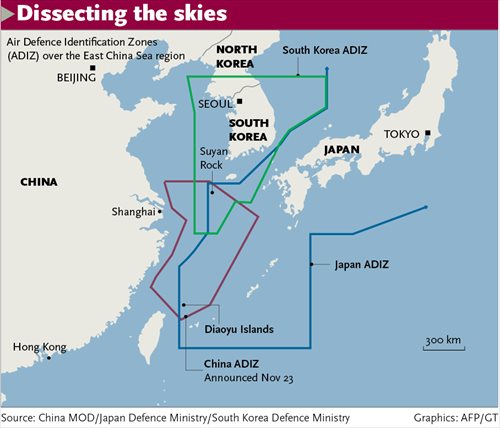Seoul expands KADIZ south

South Korea on Sunday announced a southward expansion of its Air Defense Identification Zone (KADIZ), encompassing submerged rocks within the overlapping exclusive economic zones (EEZ) of China and South Korea.
The South Korean Ministry of National Defense said the zone, which will take effect on December 15, includes the nation's two southernmost islands of Marado and Hongdo as well as Suyan Rock, a submerged reef within the overlapping EEZ of China and South Korea.
Jang Hyuk, director general for policy planning at South Korea's defense ministry, said that they wished to unite their defense zone with their Flight Information Region (FIR), an area which is set by the International Civil Aviation Organization for civilian air control.
"As the FIR covers the airspace over Ieodo (Suyan Rock) and Hongdo and Marado, the government has decided to match the KADIZ with the FIR," Jang said in a press conference.
The KADIZ was first established in 1951 by the US Pacific air force and it did not include the Suyan Rock then, Su Hao, director of the Asia-Pacific Research Center at the China Foreign Affairs University, told the Global Times.
When South Korea first established the KADIZ, it was careful not to include any disputed areas, he said. At the beginning, it included Tokdo Island (called Takeshima Islands in Japan) and was not targeted at China.
Lü Chao, a researcher at the Liaoning Academy of Social Sciences, said the latest gesture shows a provocative stance.
"The original KADIZ was established by the US more than 60 years ago and it hasn't changed all these years. South Korea and China have been at peace over the zone. This time the change in attitude is obviously a response to China's ADIZ, it's not a friendly gesture towards China," he told the Global Times.
On Tuesday, South Korea expressed regret that the Chinese ADIZ covers the Suyan Rock, and refused to recognize China's air zone.
However, Su thinks the expansion should not be read as a hostile move. "Although it objectively overlaps with China's ADIZ, it's an action South Korea took to ensure its interests and the demands of its people," he said.
The KADIZ not only overlaps with China's air zone, but also with that of Japan's. That is a sign South Korea was not specifically targeting China, he said.
China's official response also downplays possible disputes arising from the two countries' air zones.
"An ADIZ is not territorial airspace, but an identifying and early warning area set by a country outside its airspace," Hong Lei, spokesman for China's foreign ministry, said Friday in response to a question about South Korea's attempt to expand its air zone.
"South Korea's expansion of its ADIZ should comply with international laws. China is ready to stay in communication with them based on the principle of equality and mutual respect," he said.
Lü said the disagreement between China and South Korea over the submerged rocks is different from any territorial disputes between China and Japan.
"There's still room for negotiation on this issue between China and Korea," he said. "The trend between the two countries is one of strategic cooperation and the leaders from both countries won't allow major conflicts over the ADIZ."
On Friday, US State Department spokeswoman Marie Harf said US vice president Joe Biden indicated that the US was on the same page with South Korea in terms of China's ADIZ.
South Korea said it had consulted with neighboring nations before the announcement of its air zone expansion.
Agencies contributed to this story